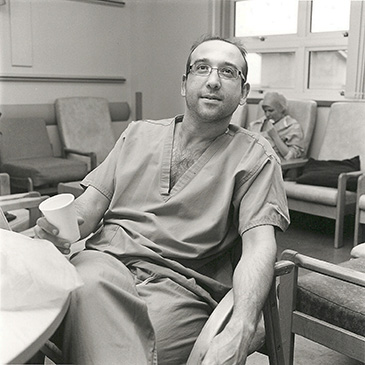As a surgeon, Dr John Bunni has helped many people survive cancer. Whilst this job is very rewarding, he felt that he could also make a significant difference to cancer patients through research. His ambition is to do a PhD but he knew that he didn’t have the practical research skills required. “Having found a mentor in science and a project that I was passionate about, what I needed was dedicated time to learn the new practical laboratory skills and develop a research portfolio,” said Dr Bunni from the Bristol Royal Infirmary (BRI), University Hospitals Bristol.
So he looked for ways in which he could work in academia and experience the research environment through a sabbatical from clinical surgery. He found the Clinical Primer Scheme from the University of Bristol's Elizabeth Blackwell Institute for Health Research. These awards, which cover up to six months of a clinician's salary, are designed to give outstanding clinicians the chance to experience a world-class research environment for the first time.
“I didn't know funding like this existed, so I was pleasantly surprised to find it,” said Dr Bunni. “Compared with most other grant applications that I have submitted, this application process was straight-forward, user-friendly and had a short turnaround time.”
During the six months he spent at the School of Physiology and Pharmacology, Dr Bunni gained new practical skills, developed his communication skills and formed collaborations with various University and hospital departments. He also perfected a multitude of laboratory techniques and familiarised himself with scientific literature needed in order to pursue a research career.
His research primer focussed on vascular endothelial growth factor (VEGF). This is a chemical which cancers secrete to create their own blood supply and grow. Patients suffering with metastatic colorectal cancer (mCRC) are often given VEGF-blocking drugs, but this treatment is only effective in about 10 per cent of patients. A group of researchers led by Professor David Bates (then at Bristol University) recently discovered that there are different types of VEGF, some of which stop new blood vessels forming rather than creating them. “Only patients with a high proportion of pro-angiogenic VEGF will benefit from treatment with VEGF blockers, so we want to develop a blood test that will identify these patients, enabling us to target treatment at those patients that will benefit the most,” explained Dr Bunni. “As mCRC is the second commonest cause of cancer death in the UK this is a real priority.”
This primer has spurred Dr Bunni on to pursue translation science alongside surgery. The six months he spent outside his comfort zone of the operating theatre were a real eye-opener. “It has made me more determined than ever to pursue an academic career,” he said. “It was a shock at first, going from being confident in my field, to being at the bottom of a very steep learning curve. I learned so much in such a short space of time and am immensely grateful to the EBI for the opportunity of the Clinical Primer scheme.”
